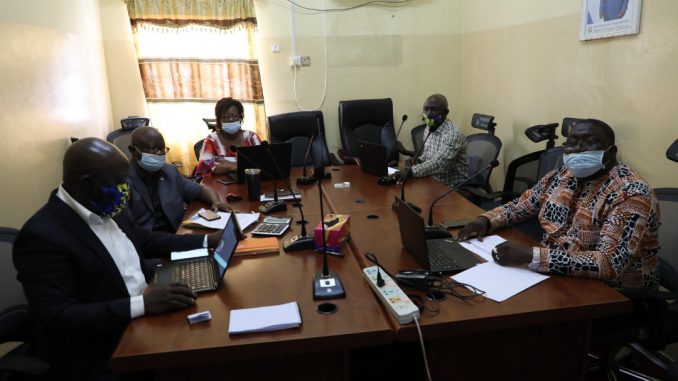
NCRA, FREETOWN, TUESDAY 23 JUNE 2020 – The Director General of the National Civil Registration Authority (NCRA) Mohamed Mubashir Massaquoi has shared Sierra Leones’s experiences on the impact of the COVID-19 pandemic on Civil Registration and Vital Statistic (CRVS) with the United Nations Legal Identity Agenda (UN LIA) and Global Civil Registration and Vital Statistics (CRVS) group webinar series held at the Authority’s Conference Room, on Walpole Street, Freetown.
The meeting, which was chaired by the Chief, Demographic and Social Statistics for the United Nations Economic Community for Africa (UNECA), William Muhwava was geared towards building a knowledge base and experience sharing on the impact of the Covid-19 pandemic challenges especially on Civil Registration and Vital Statistics among eight African countries which include: Sierra Leone, Somalia, Kenya, Tanzania, Lesotho, South Africa, the Gambia, and Liberia.
Mr. Muhwava said the meeting was basically to get first-hand information from participating countries on the impact of Covid-19 on CRVS during the first five months of 2019 and the first five months of 2020, and it aimed at assisting the countries in developing measures to restore and enhance the system and the accompanying vital statistics.
According to Muhwava, the meeting also aimed at participating countries showcasing or presenting analytical data of registration of births, deaths, marriages and other vital statistics between January to May of 2019 and January to May of 2020.
The data presented at the meeting by the participating countries was based on the UN LIA task force developed questions which was geared towards mitigating the impact of Covid-19 on the CRVS. The data also reflected the impact of Covid-19 on birth registration.
Gloria Mathenge, a Social Statistician at Pacific Community (SPC) and a participant at the meeting, presented a recap of the previous meeting on the findings of the UN LIA. She noted that the findings showed that much focus was not directed to CRVS but rather governments concentrated more on combating the corona virus. Ms. Mathenge reported that staff rotation, reduction of working hours, refocusing of CRVS budget by governments to combat Covid-19 response measure are all factors that have negatively impacted CRVS processes during the Covid-19 pandemic.


Online Participants 
Director General – NCRA
In his presentation, the Director General of the National Civil Registration Authority (NCRA), Mohamed Mubashir Massaquoi thanked the chairman of the meeting and his colleagues for giving Sierra Leone the opportunity to share its experiences on the impact of Covid-19 on CRVS and to proffer plans for the future.
Mohamed Massaquoi noted that amidst the Covid-19 pandemic challenges, the New Direction government of President Bio has been very much proactive in providing the necessary support and leadership in enhancing and strengthening civil registration, vital statistics and identity management in the country.
Giving an analysis of death registration for the period January up to April 2019 and same for 2020, the DG reported that there was a 61% reduction in death registration from 2019 and for the same period in 2020.
He said that in 2019, 22,577 deaths were recorded and deaths registered were 10,820 amounting to 48%. In 2020 4,785 deaths have been recorded so far and 4,177 deaths registered, amounting to 87%.
For data comparison for births registration, the Director General stated that there was a 7% increase in registration from 2019 for January – April 2020. He reported that in 2019, 72,928 births were recorded and 25,571 births were registered amounting to 35% and in 2020, 66,399 births were recorded and 27,276 births were registered amounting to 41%.
Mr. Massaquoi further reported that for 2019, there were 4,076 marriages recorded in the country, but not disaggregated by age, sex and date. Mr. Massaquoi informed the chairman that unfortunately, the data for 2020 was not available for comparison due to the Covid-19 restrictions on social gathering.
Speaking on the status of CRVS digitization in Sierra Leone, the DG said that the current digitization system is paper based, but, “we have started digitizing past records since 1900,” Mr. Massaquoi said. He explained that the Authority has digitized 4,500 books out of 16,000 books recorded since 1900.
The NCRA DG assured the chairman and team of the Authority’s plans to set up an electronic infrastructure system for E- Registration of births and deaths in the country.
The issue of drastic reduction of the registration of births, deaths, marriages and other vital events between the first five months of 2019 and the first five months of 2020 which was as a result of the Covid-19 pandemic was one notable factor raised by almost all the presenters during the webinar.
IEC DIRECTORATE, NCRA
Leave a Reply